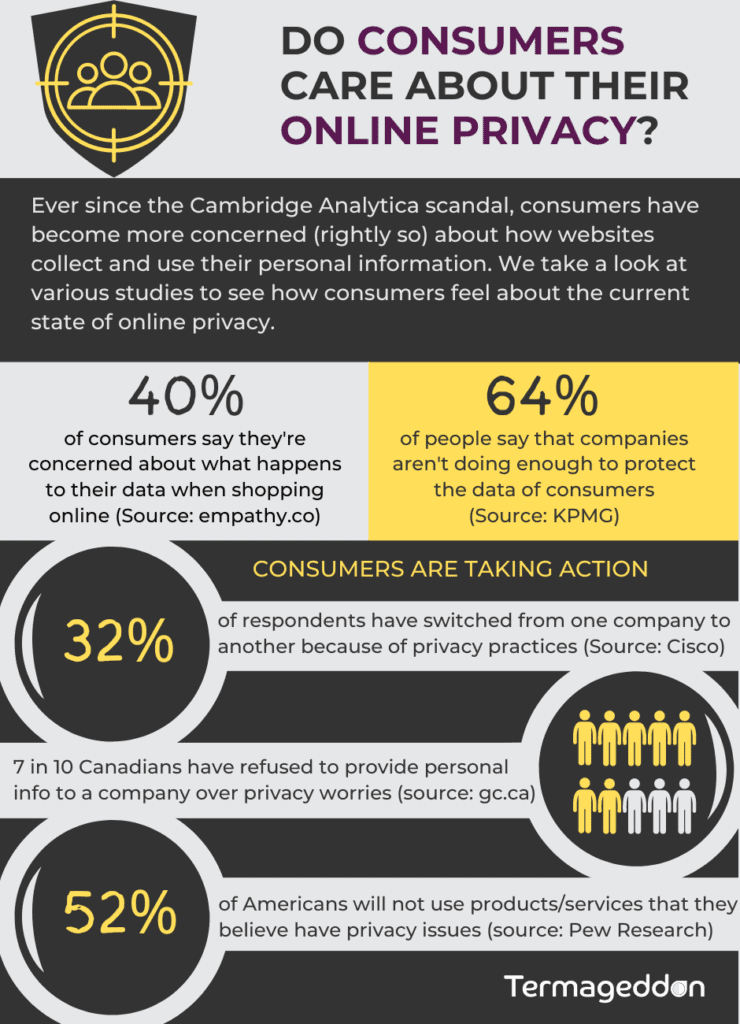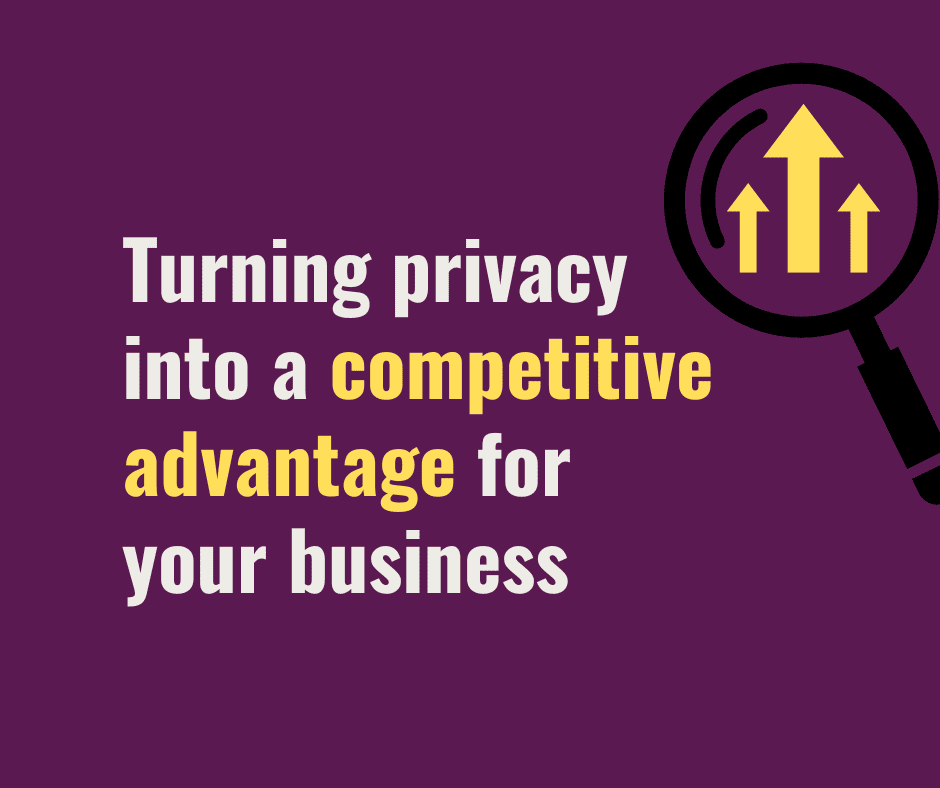Most businesses have a Privacy Policy or a cookie consent banner to comply with privacy laws and help avoid hefty fines and lawsuits, but did you know that showing your website visitors that you care about privacy can also be a competitive advantage?
You may have seen the latest Apple campaigns touting their privacy features, WhatsApp’s private messaging billboards or the DuckDuckGo private browsing ads and these companies are on to something – the fact is that consumers care about their privacy more than ever before. Consumers want to know that companies are acting responsibly with their personal information and are willing to make their buying decisions accordingly.
In this article, we will discuss privacy as a competitive advantage, including some interesting studies as well as tips on how you can show to your website visitors that you care about their privacy.
What is privacy?
Privacy is generally defined as the right to be left alone. In the business website context, privacy can best be described as allowing the consumer to determine the level of interaction that they would like to have with your business, and respecting those choices.
Consumers often share personal information such as their name, email address, phone number or IP address with business websites through features such as contact forms, email newsletter sign up forms, order placement forms or analytics. Consumers have certain expectations when sharing this personal information with a business, such as the expectation that you will not call them or text them at 3am or that you will not show up to their home unannounced. However, with increasingly invasive marketing and advertising campaigns, the sale of personal information and sharing of personal information with third parties, consumers are increasingly becoming more frustrated with companies that do not respect their privacy.
Due to this frustration, consumers are lobbying their state legislatures and governments to propose and pass privacy laws that provide them with certain privacy rights. These rights include the right to opt out of targeted advertising and marketing, the right to ask a business to delete their personal information and the right to have access to the personal information that a business has collected about them.
Do consumers really care about their privacy?
Those that have been working with business websites may remember a time when consumers submitted all kinds of personal information online without a single thought, including without checking whether the website has a Privacy Policy or has been found to be in violation of privacy laws. Unfortunately, those days are over.
Most consumers were not overly concerned about the privacy of their personal information online until the Cambridge Analytica scandal. In the 2010’s the personal information from psychological profiles belonging to millions of users of Facebook was collected by Cambridge Analytica. This personal information belonging to tens of millions of users was then used to send targeted ads regarding political campaigns. This leakage and misuse of personal information showed consumers that there are real world consequences to sharing personal information with businesses online and consumers became concerned (rightly so) about the other websites that they have provided their personal information to.
There have been quite a few studies that have shown that consumers care about their privacy online:
- A study by empathy.co found that 40% of consumers are concerned about what happens to their data when shopping online;
- A study by Consumer Reports found that 68% of Americans say that companies should be required to delete the data they have about you upon your request;
- A study by KPMG found that 64% of respondents say that companies are not doing enough to protect consumer data;
In addition, studies have shown that consumers are increasingly willing to change their buying decisions with regard to privacy:
- A study by Cisco found that 32% of respondents have switched from one company to another because of privacy practices;
- A study by the Office of the Privacy Commissioner of Canada found that 7 in 10 Canadians have refused to provide personal information to a company over privacy concerns;
- A study by Axios found that 94% of Americans would switch to a company that prioritizes data privacy;
- A study by Pew Research found that 52% of Americans will not use products or services that they believe have privacy issues.
It is clear, from the studies above, that consumers increasingly care about their privacy online, are less likely to do business with companies that they believe do not care about their privacy, and are willing to switch companies or services over privacy concerns. Keeping this in mind, it should come as no surprise that demonstrating to your customers and potential customers that you care about privacy can be a competitive advantage.

How to take advantage of this competitive advantage?
Now that you’re aware of the fact that privacy can be a competitive advantage, you may be wondering how you can communicate that you take privacy seriously to your website visitors. There are a couple of ways to communicate the fact that you care about privacy, including having an up to date Privacy Policy, displaying a cookie consent banner, responding to consumer privacy rights requests, and using data responsibly.
First, when individuals are visiting your website, they are completely unaware of your privacy practices and may have questions about whether you will sell or share their personal information. The best way to answer those questions is with a Privacy Policy. Ensure that your Privacy Policy is comprehensive, that it answers those customer questions, that it fits your actual business practices and that it is up to date with the latest privacy laws. There is nothing that erodes trust quite like a Privacy Policy that was last updated in 2010, that includes empty paragraphs or that lists your competitor’s business name because you copied and pasted it from a competitor’s website. If you do not currently have an up to date Privacy Policy that fits your business practices, make sure to check out the Termageddon Privacy Policy generator. You should also ensure that your Privacy Policy is easy to find on your website so that consumers can read about your privacy practices.
Second, consumers may not want to be tracked by analytics or may not want to receive targeted ads across multiple websites. Having a cookie consent banner that actually allows consumers to consent to tracking (via an “accept” and a “deny” button) is the best way to show consumers that they have an actual choice. If you are required to have a cookie consent banner by the privacy laws that apply to you, make sure that you choose one that obtains actual consent and honors that request by not applying tracking scripts unless the user actually consents to being tracked. You can achieve this through the Termageddon/Usercentrics cookie consent banner solution.
Third, you should promptly respond to and respect users who have asked to exercise their privacy rights. For example, if a consumer reaches out to you and asks you to opt out of email marketing messages, you should remove them from the email marketing list and stop sending them those messages. Most privacy laws provide a period of 15-45 days in which to respond to requests, so you should ensure that you are responding within the applicable time frame to reduce frustration, potential fines and complaints.
Fourth, you should ensure that you follow privacy by design principles on your website. For example, do not collect more personal information than you need, make privacy information easy to find, respect user choices, and implement proper security measures to protect personal information.
Lastly, treat others how you’d like to be treated. No one likes spam calls, spam text messages, or hundreds of marketing emails in their inbox every day. Make sure to tailor your messaging and reach outs to customer preferences and keep the intervals of these messages reasonable. Do not send marketing messages to individuals who did not ask for them and remember that keeping privacy in mind can actually win you customers.




